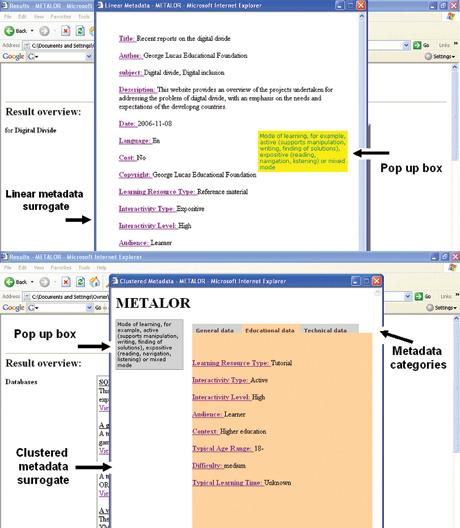by Anne Morris, Ann O'Brien and Panos Balatsoukas
Research conducted in the Department of Information Science at Loughborough University in investigating the evaluation and design of usable schemes for learning object metadata.
Learning object metadata can be defined as structured data used for the efficient description of learning objects and the effective support of educational functions related to those objects. There are several metadata standards and schemas available for the description of learning objects, such as the LOM (Learning Object Metadata) and the DC-ed (Dublin Core - Education). The use of high-quality and usable learning object metadata has significant implications for the development of e-learning infrastructure in UK higher education. These include:
- the realization of an e-learning infrastructure based on a vision of the semantic Web
- more accurate retrieval of learning objects within and across individual institutions
- improved searchability and relevance evaluation of learning objects in search and search-result interfaces of e-learning systems, such as educational digital libraries
- increased reusability of learning objects and learning content in various instructional contexts (learning object economy)
- adaptability and personalized delivery of learning content according to users' needs
- management and preservation of the contents of Learning Object Repositories (LORs).
Currently, research on learning object metadata is dominated by an interest in interoperability and standardization issues, and the social and human aspects of metadata implementation have been neglected. Research into users needs in relation to learning object metadata is therefore needed.
The aim of the work currently being undertaken in the Department of Information Science at Loughborough University is to investigate the way in which learning object metadata should be designed to meet the needs of university students and teachers in the UK. In particular, the objectives of the project are:
- To explore the level of uptake of learning object metadata among UK universities and develop a roadmap of metadata research activity in the UK.
- To improve the semantics of existing learning object metadata standards, such as LOM, and design a user-centred learning object metadata application profile.
- To develop a set of recommendations and guidelines for the design of interfaces of e-learning systems that represent learning object metadata. There are three types of interface that are of particular interest: interfaces of metadata authoring and editing tools; metadata-driven search interfaces; and search result interfaces. These types of interface are present in Learning Object Repositories, Educational Digital Libraries and Virtual Learning Environments (VLEs).
- To develop and apply a methodological framework for design research on learning object metadata.
The project involves academic staff and research students from within the department. The key members of the project are Professor Anne Morris, Dr. Ann OBrien and Panos Balatsoukas. The group's expertise covers various research domains including e-learning, knowledge management, human computer interaction, information processing, and metadata and relevance judgment research.
Since the beginning of this project (December 2005), several studies have been conducted. One experiment investigated students' interactions with two different learning object metadata-driven search result interfaces: a linear metadata surrogate interface and a clustered metadata surrogate interface (see Figure 1). The results of this study revealed that participants were significantly more satisfied with the clustered interface. This interface minimized users' cognitive load when judging the relevance of learning objects.

A survey was conducted on the use of the LOM standard in the JORUM repository. The results of this study revealed limited use of metadata elements describing the structure and aggregation level of a learning object as well as metadata about the relationship between learning objects. Furthermore, the study revealed that certain educational metadata elements tended to be more frequently used for the description of learning objects from the Humanities and Social Sciences than other disciplines.
Another survey investigated students' perceptions of the importance of certain metadata elements of the LOM standard in the selection of learning objects. Some preliminary findings revealed that students generally preferred the educational and content-related metadata to technical metadata and metadata about the structure of a learning object.
Research is in progress to investigate students' interactions with three Learning Object Repositories (JORUM, MERLOT and ARIADNE). Future research will concentrate on the needs of university teachers in relation to learning object metadata, as well as the design of a collaborative learning object metadata creation system for the UK higher education system.
Our research team has developed a methodological framework that adopts both a behavioural and design research approach. These approaches support the development and evaluation of theories and artefacts (eg metadata application profiles and prototype systems). Within this framework a variety of research methods have been employed, such as experiments, usability tests, user studies and online surveys. The data collected has been analysed within a positivist research tradition. It is anticipated that the findings, artefacts and methodological framework of this project will inform the design and evaluation of user-centred learning object metadata in the European Union and support comparisons between countries.
Please contact:
Anne Morris
Loughborough University, UK
E-mail: A.Morris![]() lboro.ac.uk
lboro.ac.uk










